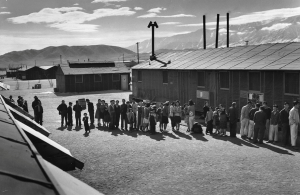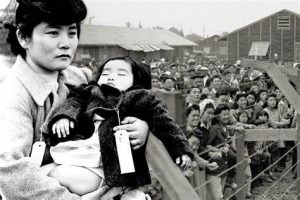 A while back, my sister, Cheryl Masterson suggested a book to me because she knew that I liked World War II history. The book, Midnight In Broad Daylight, by Pamela Rotner Sakamoto, was about, among other things, the plight of the Japanese American citizens that followed the attack on Pearl Harbor. The book covered a couple of specific families, but as I listened to it through Audible, I began to consider just how the Japanese American citizens, many of whom were born in the United States to legal immigrants from Japan long before the war and the attack on Pearl Harbor ever happened.
A while back, my sister, Cheryl Masterson suggested a book to me because she knew that I liked World War II history. The book, Midnight In Broad Daylight, by Pamela Rotner Sakamoto, was about, among other things, the plight of the Japanese American citizens that followed the attack on Pearl Harbor. The book covered a couple of specific families, but as I listened to it through Audible, I began to consider just how the Japanese American citizens, many of whom were born in the United States to legal immigrants from Japan long before the war and the attack on Pearl Harbor ever happened.
For all intents and purposes, it seemed that these people were loyal to their new country. Many wanted to serve in the US military to fight against the Axis of Evil countries, including Japan. I could see that, but I could also see the other side of the coin. The rest of the American people were scared. They didn’t know if they could trust these Japanese American citizens. They wondered if they were spies, sent to infiltrate our defenses. Before anyone could really give the situation a second thought, if was decided that the Japanese American citizens and the legal immigrants awaiting naturalization, had to be placed in Japanese internment camps which were established by President Franklin Roosevelt through his Executive Order 9066. At the time, no one could really look rationally at both sides of the situation. It was an awful time for many people.
I thought about the people who really were loyal to the United States. They wanted to help, but no one trusted them. Many of them still had family in Japan, so their loyalties might have been divided, even if they didn’t agree with the attack on Pearl Harbor. I suppose some might have actually been loyal the Japan, I don’t know if we will ever really know for sure. It didn’t matter anyway, because their lives were put on hold…indefinitely. Some people got out of the camps because they had language skills the US military needed. These people were give a chance to get out of the camps, in exchange for serving in the military and making valuable translations. There weren’t a lot of them, but those who did this important work proved themselves to be loyal. Some had been trained in Japanese schools, prior to coming to America. Some had family in Japan, and even family in the Japanese military. I couldn’t imagine how torn they must have been, but they did their jobs. I don’t know if they knew about what was coming for Hiroshima or Nagasaki, but the people in the true story of the book, had  family in Hiroshima on the day of the atomic bombings, as well as family in the Japanese military. They had no way to tell them to get out of town, although civilians were warned to get out. People didn’t trust what they were told, or just didn’t understand what was going on. Somehow, the family in the book survived, but so many didn’t. I can’t feel sorry for any of the Japanese people who agreed with what the Japanese government was doing, but there were people there, as there always are, who didn’t have a choice. They were caught on the wrong side and they couldn’t leave. Those Japanese Americans were caught too. They were on the right side, but they were caught on the wrong side of the right side…if that makes any sense at all.
family in Hiroshima on the day of the atomic bombings, as well as family in the Japanese military. They had no way to tell them to get out of town, although civilians were warned to get out. People didn’t trust what they were told, or just didn’t understand what was going on. Somehow, the family in the book survived, but so many didn’t. I can’t feel sorry for any of the Japanese people who agreed with what the Japanese government was doing, but there were people there, as there always are, who didn’t have a choice. They were caught on the wrong side and they couldn’t leave. Those Japanese Americans were caught too. They were on the right side, but they were caught on the wrong side of the right side…if that makes any sense at all.


One Response to On The Wrong Side Of The Right Side